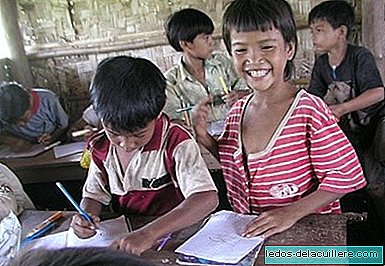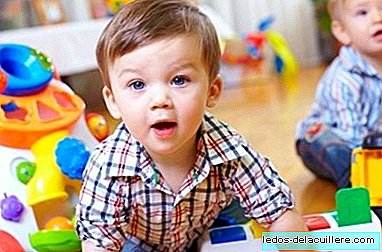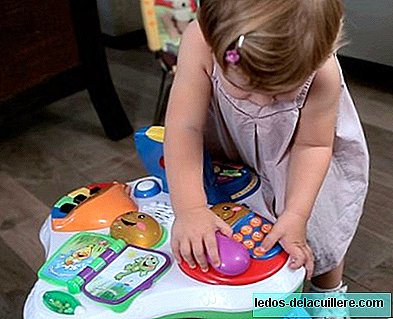
A few days ago we were talking about a program of UNESCO, UNICEF and other international organizations that sought Education for all, agreeing on a global commitment to provide quality basic education to all children, youth and adults.
The Decalogue of "Education for all" stops at the foundations of this program, analyzing the difficulties and needs for its implementation.
They are interesting to read to realize what is necessary for an educational extension, as well as the demand for social involvement and the multiple resources that make it not an easy task.
Education for Everyone is a right
In 1945, more than 60 years ago, the countries that founded UNESCO signed a constitution in which they claimed to be "persuaded of the need to ensure full and equal access to education for all." Since then, a part of UNESCO's mission has consisted of an effort to make these possibilities come true.
The Universal Declaration of Human Rights also postulates that "Everyone has the right to education" (Article 26). For all the years since then, the purpose has been the same as now: to give each person the possibility to learn and benefit from basic education, not for a chance of circumstances, not as a privilege, but as a RIGHT.
Education for All concerns us all
On the initiative of UNESCO and four other United Nations organizations (the United Nations Children's Fund (UNICEF), the United Nations Environment Program (UNEP), the United Nations Population Fund (UNFPA) and the World Bank), the countries of the world met in 1990 in Jomtien, (Thailand) to approve a new basic education strategy.
In view of the limited progress achieved over the decade, 164 governments and associated entities met again in Dakar (Senegal) in 2000 to ratify their commitment and approve the six goals of EFA. These objectives reflect a global perspective of education, from the care and development of early childhood to literacy and the acquisition of skills for active life by young people and adults.
Three of these objectives have a fixed term: to ensure that all children complete quality primary education, increase the number of literate adults by 50% and eliminate gender disparities in education, all by 2015.
Education for All is essential for development
Education opens roads to all people and communities. It is one of the bases to reach the Millennium Development Goals agreed in 2000, because it is essential to provide children, youth and adults with the knowledge and skills that allow them to make informed decisions, improve their health and standard of living, and achieve a safer and more sustainable environment.
As the Delors Report pointed out in 1996, education allows us to learn to be, to know, to do and to live together. In other words, education gives us the possibility of reaching our maximum potential as human beings. The construction of a world of peace, dignity, justice and equality depends on multiple factors, among which education is undoubtedly one of the most important.
Education for All is, as the name implies, FOR ALL
In the past, girls and women They had not enjoyed the same possibilities of receiving basic education. Even today, more than 55% of out-of-school children are girls and women represent two thirds of illiterate adults. To compensate for this asymmetry, special efforts are needed, from the hiring of teachers who help the poorest families to the creation of more conducive school contexts for girls.
Other groups have also been neglected: indigenous populations and those residing in very remote rural areas, "street children", immigrants and nomads, the disabled, linguistic and cultural minorities, just to mention a few. The new strategies have to adjust to your needs; It is not reasonable to think that the situation of marginality they suffer will be rectified simply because the possibilities of formal schooling increase.
Education for All at all ages and in all contexts
The six goals of EFA emphasize the possibility that each person benefits from basic education, from children participating in home and preschool programs, to adults, through primary school students, adolescents and young people
No one is too young to start learning and nobody is too old to acquire basic skills, such as the ability to read and write and elementary arithmetic notions. Since the transmission of knowledge it does not always occur in formal teaching contextsIt begins long before primary school and continues throughout life, families and communities should be encouraged to foster environments conducive to education.
In fact, basic education for all ages reinforces the capacity of families and communities, and opens the way for greater options and possibilities for the next generation.

Education for All is synonymous with quality integrative learning
The motivation necessary to learn or overcome the difficulties posed by the study is only effective when education is perceived as worthwhile, and this depends on its quality. Attending school or participating in a non-formal adult education course should result in the acquisition of knowledge, skills and values that the learner can apply profitably, with the impression of being able to achieve goals that were previously inaccessible.
The quality of education It depends fundamentally on the teaching / learning process, as well as the relevance of the curricula, the availability of teaching materials and the conditions of the teaching environment. Therefore, emphasis is placed on the provision of educational services that respond to the needs of the student and are relevant to his life.
Education for All is giving great results
The EFA Global Monitoring Report, which is published annually, monitors progress in achieving the six EFA goals, compares the teaching situation between countries and defines trends. The latest issues of the Report provide evidence of the remarkable progress made in education since 2000 and demonstrate that these educational goals are affordable.
Today there are more boys in the world than ever before, and the largest number of girls enrolled in history, although the goal of achieving gender parity in 2005 was not met.
The gross enrollment rate in primary education has grown considerably in Sub-Saharan Africa and in South and South-West Asia, which are the most distant regions in achieving the objectives. The number of secondary school students has increased greatly (it has been four times higher than the increase in elementary school students).
In 70 of the 110 countries that provided statistical data, public spending on education increased as a fraction of national income. Progress towards other objectives such as extending comprehensive protection and education of early childhood (Objective 1) and promoting access for young people and adults to learning and active life preparation programs (Objective 3) is more difficult to assess, but it is clear that the effort is paying off.
Education for All still faces many challenges
At present, advances in pursuit of EFA goals are not fast enough for all countries to comply with what is planned by 2015. According to recent calculations, there are some 75 million children who are not yet in school and it is estimated that around 776 million adults (16% of the world's population) have not had the opportunity to learn to read and write.
Millions of students enrolled today will drop out of school or drop out of school without even having acquired the basic skills in reading, writing and arithmetic. In addition, in many countries the proportion of students per teacher is more than 40: 1 and there is an acute shortage of teachers: it is estimated that around 18 million more educators will be needed worldwide to achieve universal primary education from here to 2015
It can also be seen that education does not benefit everyone equally and the learning opportunities of adolescents and out-of-school youth remain scarce in many developing countries. Poverty, geographic isolation, sex, language and ethnicity are some of the obstacles that hinder progress. The tasks of increasing the number and quality of teachers, improving the management of schools and the education system, reaching the less favored and marginalized groups, and addressing the consequences of HIV and AIDS, all require more means Innovative and intensive offer learning possibilities.
Education for All needs everyone's support
In order to achieve EFA objectives, money, personnel, technical skills, operational institutions and, last but not least, are needed, political will. UNESCO works to maintain the momentum of the international community through a Working Group and a High Level Group on EFA and carries out the coordination of activities throughout the world.
Aid agencies and development banks, such as the World Bank, are increasingly allocating resources to education, although they are still far from reaching the amount deemed necessary to achieve the goal of universal primary education (an aid annual external of US $ 7,000 million) not to mention the other five objectives.
Concertation is essential: more and more importance is given to making aid that is consistent with national development goals. Civil society is a fundamental partner, both for fundraising and the task of offering learning alternatives to disadvantaged sectors of the population. Knowledge sharing, collaboration and capacity building need to be strengthened, as well as intensifying coordination, so that joint efforts are effective and resources are used more efficiently.
Education for All has a multiplier effect
By improving people's ability to initiate, manage and maintain positive changes in their lives, education has a great multiplier effect that brings lasting benefits to families and communities. But the opposite effect is also real, since in general there is twice the probability that a mother without instruction does not send her child to school to do so one who has received some education.
So education for all is fundamental and is also the basis to give all people better chances of success and overcome discrimination based on sex and other forms of injustice.
Definitely, the Decalogue of Education for all It is a reminder of the long way to go but also that, step by step, the objectives towards universal education are being achieved.












